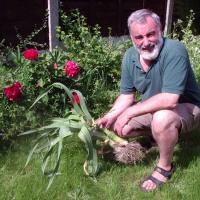글: 14
언어: English
austin_b (프로필 보기) 2012년 12월 29일 오전 6:03:01
I'm looking for free (or cheap) books as a beginner in Esperanto. I know this site has a list, but I was wondering if any of you could recommend others.
Dankon!
erinja (프로필 보기) 2012년 12월 30일 오후 12:25:01
You don't actually find a huge amount of literature written in Esperanto and aimed at beginners. I think it's because people remain beginners for a relatively short time and they're ready to move to 'normal' Esperanto. There just isn't a huge gulf between 'normal' Esperanto and 'beginner' Esperanto, other than the depth of the vocabulary, so I usually don't suggest spending too much money on things aimed at beginners.
I like books of short stories for beginners. The Esperanto is normal so you'll still enjoy it when you're no longer a beginner, and the stories are short enough that even if you read very slowly and look up a ton of words in the dictionary, it doesn't take you forever and ever to get through ti.
Denaska Kongresano is a nice set of short stories, downloadable for free in PDF format.
What do you normally like reading in English?
bartlett22183 (프로필 보기) 2012년 12월 31일 오후 6:52:15
ratkaptisto (프로필 보기) 2012년 12월 31일 오후 8:21:06
erinja (프로필 보기) 2013년 1월 1일 오전 3:39:49
Stano's book is a textbook. Or are you aware of a book that he wrote that is simply for reading rather than learning?
I forget whether it's in lernu's list and I can't be bothered to check, but "Karlo" by Edmond Privat is an early Esperanto book aimed at beginners (available at Project Gutenberg here; do a search at Gutenberg for Esperanto and you can find more free books)
I have never read it all the way through but it has comprehension questions at the end of each chapter, which may be helpful.
keithwood57 (프로필 보기) 2013년 1월 1일 오후 3:07:09
I came across the following sentence in ‘Karlo’:
‘Ĉe la baptotago de Karlo, preskaŭ la tuta familio de Sinjorino Davis ĉeestis...’
(‘On the baptismal day of Charles, almost the entire family of Mrs. Davis was present...’)
Easy enough to translate, of course, but I (and Google translate) are baffled by: ‘baptotago’
Is this acceptable as word in its own right, or is this a misprint for bapto tago?
Keith
(And Happy New Year - Bonan Novjaron)
erinja (프로필 보기) 2013년 1월 1일 오후 7:56:37
Your options are to make it a single compound word (baptotago or bapto-tago) or to make the description word into an adjective (bapta tago), or use a "de" construction ("tago de bapto" ). The adjective option can sometimes change the meaning, if the particular noun has a separate adjectival meaning (a word like "hairy" comes to mind - it doesn't mean "for hair" or "relating to hair" )
austin_b (프로필 보기) 2013년 1월 3일 오전 5:53:22
erinja:ratkaptisto, since this is the English forum, please post in English here (or include an English translation with your Esperanto)Dankon! I will definitely look into reading that. I have printed out the Cindrulino story by La Fratoj Grimm, but I am not sure if the vocabulary is too large for a beginner. But, I figure the more practice and reading I can do, the better.
Stano's book is a textbook. Or are you aware of a book that he wrote that is simply for reading rather than learning?
I forget whether it's in lernu's list and I can't be bothered to check, but "Karlo" by Edmond Privat is an early Esperanto book aimed at beginners (available at Project Gutenberg here; do a search at Gutenberg for Esperanto and you can find more free books)
I have never read it all the way through but it has comprehension questions at the end of each chapter, which may be helpful.
Gosudar (프로필 보기) 2013년 1월 5일 오후 10:18:56
Miland (프로필 보기) 2013년 1월 5일 오후 11:00:26
Piron, Claude: Gerda Malaperis, Vere aŭ fantazie, (as Valano, Johán) Ili Kaptis Elzan!
Baghy, Julio: La Verda Koro
Korenkov, Alexander (ed.): Vivo kaj morto de Wiederboren
Chinese Esperanto Publishing House, Beijing: Rakontoj pri Afanti (Stories about Nasruddin), Saĝo-Sako (Sack of Wisdom), La Feliĉa Birdo (The Happy Bird), La Magia Ŝipo (The Magic Ship), Papilia Fonto (Butterfly Source), Bovisto kaj Teksistino (Cowherd and Weaver Girl), Paŝtisto kaj Feino (Shepherd and Fairy), Rateto Volas Edziniĝi (Little Rat Wants to Marry), Alfluginta Monto (The Mountain That Flew In).
Sten Johansson: La krimo de Katrina, La orpantalono, Inter tero kaj ĉielo, Vojaĝo kun Katrina, Katrina malfruas, Kion ajn.



